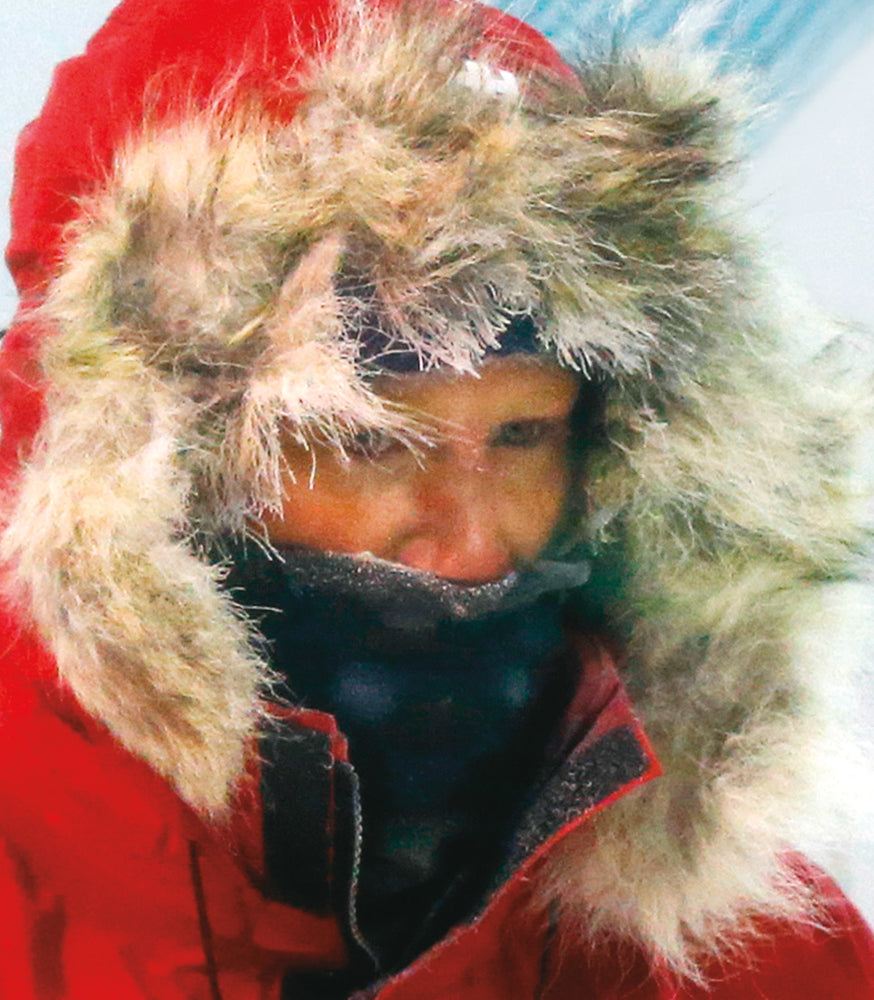
Prince Harry In Antarctica
PRINCE HARRY IN ANTARCTICA

A PLAYBOY’S PROGRESS
It was, by any standard, an achievement worth celebrating: a three-week, two-hundred-mile trek across the most inhospitable landscape on earth in temperatures as low as minus fifty. His companions were a group of wounded soldiers — men and women missing one or more of the legs, arms, and eyes they were born with because of injuries sustained on the battlefield.
And so, having finally arrived at the South Pole, Prince Harry was not alone in feeling that a drink was in order. Bottles of champagne were magically produced, but glasses could not be found. So when Sergeant Duncan Slater, who lost both his legs in Afghanistan in 2009, proposed they use his artificial limbs, Harry (who had grown a shaggy beard in the course of the expedition) and the rest of the team enthusiastically embraced the comic symbolism of the moment.
“I wedged a champagne bottle in each leg and passed them around,” Slater says. A legendary Antarctic party, and a thousand jokes about getting legless, ensued. When the champagne ran out, “Most of us, Harry included, went on a two-day bender with our Icelandic truck drivers,” recalls the actor Dominic West, who was part of the expedition. “They’d brought some lethal home brew with them.”
The image of Harry partying at the Pole may have fit conveniently into the media’s “playboy prince” storyline, but reality is inevitably more nuanced. In truth, his trek to the South Pole last December was a difficult and dangerous slog. In fact, it was nearly called off several times due to potentially life-threatening blizzards.
But it was also an important staging post for the young royal, who recently turned thirty, on the road to what longtime friends and palace insiders are describing as a newfound maturity.
Harry’s journey, which raised millions of pounds for the injured servicemen’s charity Walking With The Wounded, actually began five years earlier, when he was riding home on an army transport plane after serving a brief tour in Afghanistan in 2008. He was pulled out early after a magazine, unaware of the news blackout, ran a story on his deployment.
Harry was traveling home on a plane with three wounded British soldiers, all of whom were in induced comas. Takeoff was delayed while the body of a Danish soldier was loaded into the hold.

“It was a dramatic and sobering moment for the young prince, who, despite his tragic childhood, had lived most of his life inside a cocoon of otherworldly privilege.”
It was a dramatic and sobering moment for the young prince, who, despite his tragic childhood, had lived most of his life inside a cocoon of otherworldly privilege. The prince now says of that experience, “To see young lads — much younger than me — wrapped in plastic and missing limbs with hundreds of tubes coming out of them was something I never prepared myself for.”
His determination to do something meaningful for wounded soldiers was, at first, a noble but somewhat shapeless notion. He reached out to Walking With The Wounded, becoming a patron of the charity, but was unable to join its 2011 trek to the North Pole — a less forbidding challenge than the South Pole — due to his brother’s wedding to Kate Middleton. He had to pass on another expedition to scale Everest in May 2012 because of military commitments.
It was a frustrating time for the charity, as its star supporter was twice unable to participate in the headline-grabbing expeditions they had organized.
But everything changed for Harry following the publication of photos taken in a Las Vegas hotel room. They depicted the young prince playing (and apparently losing) a game of strip billiards in the summer of 2012, just days after he had been lauded for his stately bearing when closing the London Olympics on behalf of his grandmother.
“It was probably a classic case of me being too much Army and not enough prince. It’s a simple case of that,” he said of the photos at the time.
Although he remains defiant in private, insisting to friends he did nothing wrong, there is little doubt among those who know him that the humiliation of the photos was a wake-up call to Harry, and ultimately the catalyst for a long-overdue reappraisal of his life.
Just a few weeks later, he shipped out to Afghanistan for a second tour of duty, flying Apache helicopters on the front line. Harry killed Taliban insurgents while on duty — “Take a life to save a life,” he remarked, perhaps a bit too casually — but it was not combat per se that provoked a renewed bout of soul-searching.
It was, once again, the horrific injuries that he saw inflicted both on his own side and on innocent civilians that hit him the hardest. Even today, when Harry closes his eyes, he says that “hundreds of images” comprising a “visual diary” of his frontline experiences flash through his mind.
“I saw some horrendous things,” the prince says. “The tragic injuries and deaths of local people from roadside bombs, some of whom were children; coalition forces lying on the battlefield.” Harry says that the memory of the things he saw, and the phrase “op vampire,” which would come crackling over the Apache’s radio when a casualty needed a lot of blood, “still send shivers down my spine.”

Lying in his bunk late at night, his barracks shaking from the downforce of Chinook and Black Hawk helicopters ferrying casualties to and from the field hospital at Camp Bastion, Harry made a decision: when he got home, he would use his position to make a difference in the lives of wounded servicemen.
Whether it was age, a determination to make up for Vegas, or just a consequence of the horrors he had seen firsthand, this time Harry really meant it. “Clearly, his second tour of duty in Afghanistan had a big impact on him,” a source close to the prince says. And when he got home, Harry knuckled down.
The first thing he did was sign up for the trek to the South Pole with Walking With The Wounded, which retrains wounded soldiers for civilian careers, sweeping aside the kinds of objections from military paper-pushers that had nixed his efforts to climb Everest the year before. Harry knew that his presence on the polar hike would raise the profile of the charity by an incalculable factor.
“Supporting wounded servicemen and women has become one of the defining aspects of Prince Harry’s professional life over the past few years,” a confidant tells Man of the World. “He has a genuine compassion and understanding of the issues at hand, drawn from his own very personal experiences.”
With the benefit of a long-term girlfriend by his side, British aristocrat Cressida Bonas (the two are now back together, friends say, after a split over the summer), Harry settled into a noticeably calmer and more focused pattern. The most immediate consequence of this was that his regular late nights out at London clubs swiftly became a thing of the past — much to the chagrin of the paparazzi and the hordes of “Harry Hunters” who had taken to besieging Chelsea’s more louche nightspots in hopes of getting close to him.
Of course, the fun-loving Harry didn’t disappear overnight. Far from it. And on the polar trek, his cheeky-chappy persona was very much in evidence. “He would often reach the meeting point before the rest of the guys and would build these incredibly lavish, castellated latrines, with battlements and loo paper–roll holders,” says Dominic West. “It must have taken him forty minutes at least to build. They were just fabulous. I would often sit on the latrine thinking, ‘This is a royal flush in every way’.”
In May 2013, Harry found even more inspiration for his new purpose on a trip to the USA, where he attended the Warrior Games, a Paralympic-style event for wounded US and UK service- men, now in its fifth year. He joined in a game of seated volleyball with wounded veterans and vowed that he would host a similar, but bigger, international event in the UK the following year.

“Having finally arrived at the South Pole, Prince Harry was not alone in feeling that a drink was in order.”
It was a typically impetuous, single-minded decision, made without consultation or planning. But convinced of his own ability to get things done, Harry set out on a one-man mission to do something remarkable for his wounded comrades. The result was the Invictus Games, which took place this September in London, with three hundred competitors from thirteen nations competing in sports such as indoor rowing, road cycling, and archery.
Even if the difficulty of selling fifty-five thousand tickets was a slightly rude awakening to the limits of royal influence, the Invictus Games made for an astonishing and inspiring spectacle.
I watched some of it on TV with my eight-year-old son. The sight of men with two false legs hammering their way around the Olympic stadium was an awe-inspiring master class in the simple heroism of never giving up. Harry had to tread a fine line, using his name and position to bring attention to the games without allowing his personality to overshadow the feats of the competitors. He did, however, sprinkle a little stardust on the event when he participated in an exhibition game of wheelchair basketball while Bonas looked on from the bleachers.

A source who knows Harry well says, “He fully understands that he is now in a position to help shine a spotlight on these important issues and use his convening power — just like his brother and other members of his family — to drive forward positive changes. He has often said he feels most comfortable when he is with military personnel, and he sees it almost as his duty to help those who need support, for whatever reason.”
While those in Harry’s inner circle say it’s not something he would “never acknowledge,” the simple truth is that without his unique mixture of bluster and humility, the Invictus Games would never have happened.
Harry freely admits he underestimated the logistics involved in putting on such a complex event, but says easing the plight of wounded soldiers is a lifetime commitment. I’ll drink to that. Even out of a prosthetic leg.


